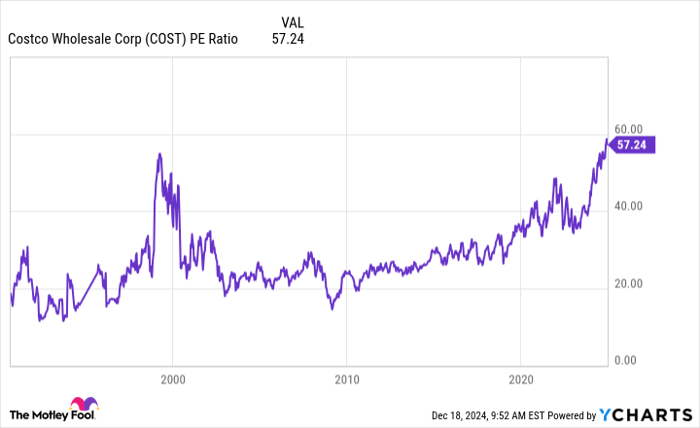When it comes to solid retail businesses, investors may struggle to outdo Costco (NASDAQ: COST). The warehouse retailing giant's stock seemingly continues to defy gravity. Despite increasingly strong arguments for the stock's overvaluation, it is up 50% over the last year.
That situation understandably leaves investors wondering how to move forward with Costco stock. Do the continued increases mean investors should buy because its valuation no longer matters? Also, even if one holds it, can a shareholder make a case for staying in the stock, or is its price so stratospheric that all investors should stay away? Given these possibilities, investors should take a closer look at the retail stock before making such decisions.
Where to invest $1,000 right now? Our analyst team just revealed what they believe are the 10 best stocks to buy right now. See the 10 stocks »
Costco's attributes
Despite the intense competition in retailing, Costco holds some distinct advantages. Indeed, it has to compete with Amazon, which does not have the overhead costs of maintaining warehouse stores and has other businesses that could theoretically absorb the losses of retail operations.
Still, investors should remember that even Amazon's fulfillment centers constitute overhead costs, negating much of that advantage. Moreover, Costco sells most items in bulk, giving it an added ability to slash prices.
Furthermore, Costco has sidestepped the cultural challenges that hampered the international growth of retailers such as Walmart and Home Depot. Hence, while these retailers have little room to add locations, Costco has barely scratched the surface of its potential store growth despite operating in 47 U.S. states and 14 countries.
Furthermore, Costco has fostered strong customer loyalty. Its membership renewal rate is 90% globally, and despite a recent membership price hike in the U.S., 93% of American Costco members choose to renew their memberships.
Costco by the numbers
Unfortunately, such advantages do not come cheap for investors. The stock's increasing buyer interest has taken its P/E ratio to almost an all-time high of 57, making continued increases in the stock price less likely. Also, its forward earnings multiple of 54 indicates that rising profits will not lower its P/E ratio significantly.
COST PE Ratio data by YCharts
Additionally, its financial performance does not appear to justify its earnings multiple. In the first quarter of fiscal 2025 (ended Nov. 24), the total revenue of $62 billion rose 8% year over year. Looking more broadly, revenue rose 5% in fiscal 2024 (ended Sept. 1), pointing to a respectable but not outsized growth rate.
In fiscal Q1, net income was $1.8 billion, growing 13% as income from non-operational sources boosted the company's profits. Still, that has fallen from the 17% increase in fiscal 2024.
Looking forward, analysts forecast that revenue will grow by 7% in the current fiscal year and by the same percentage in the following 12-month period. When also considering the aforementioned 57 P/E ratio, the financial performance indicates that Costco stock is not a good buy.
Moreover, dividends are unlikely to help. Although the company consistently raises its payout, its $4.64 per share annual payout amounts to a dividend yield of less than 0.5%. This is far below the 1.2% average of the S&P 500.
Also, while it paid a $15 per share special dividend last year, Costco would have to pay that every year to beat the averages. Unfortunately for its investors, its previous special dividend of $10 per share occurred in 2020, likely not enough to make it an excellent income stock.
Additionally, the stock is approaching levels so high that investors might want to consider selling. It took much lower valuations to persuade Warren Buffett's team at Berkshire Hathaway to close its long-held Costco position in 2020.
While Buffett later described the move as "probably a mistake," one could argue that he was early instead of wrong, prompting more investors to sell the stock.
Is Costco stock a buy, sell, or hold?
Under current conditions, investors should probably consider selling Costco stock.
Admittedly, Costco is one of the more solid retail operations in existence. At a lower valuation, one could make a case for holding Costco stock.
However, Costco's growth is such that its earnings multiple will not fall significantly without a considerable stock price decline, a move that seems likely if history is a guide. Moreover, the dividend is likely not enough to retain income investors. Even though Costco's business will likely continue growing in the long term, its stock appears overdue for a significant pullback.
Don’t miss this second chance at a potentially lucrative opportunity
Ever feel like you missed the boat in buying the most successful stocks? Then you’ll want to hear this.
On rare occasions, our expert team of analysts issues a “Double Down” stock recommendation for companies that they think are about to pop. If you’re worried you’ve already missed your chance to invest, now is the best time to buy before it’s too late. And the numbers speak for themselves:
- Nvidia: if you invested $1,000 when we doubled down in 2009, you’d have $349,279!*
- Apple: if you invested $1,000 when we doubled down in 2008, you’d have $48,196!*
- Netflix: if you invested $1,000 when we doubled down in 2004, you’d have $490,243!*
Right now, we’re issuing “Double Down” alerts for three incredible companies, and there may not be another chance like this anytime soon.
*Stock Advisor returns as of December 16, 2024
Will Healy has positions in Berkshire Hathaway. The Motley Fool has positions in and recommends Berkshire Hathaway, Costco Wholesale, Home Depot, and Walmart. The Motley Fool has a disclosure policy.
The views and opinions expressed herein are the views and opinions of the author and do not necessarily reflect those of Nasdaq, Inc.



